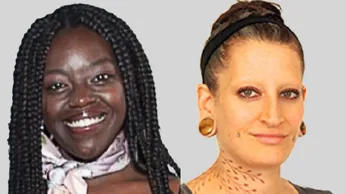Three Questions on SDG 5 – Gender equality and Women’s empowerment
- 2020-09-29
- Comment

We spoke with Jenny Dembrow and Ebonie Simpson, Co-Executive Directors of the Lower Eastside Girls Club in New York City, about connecting girls and young women to healthy and successful futures and the importance of community engagement. Both have been long-term contributors to the Girls Club’s successful progression from a grassroots initiative to a center of innovation in the field of community-based youth development. Today, the Girls Club impacts the lives of thousands of girls in middle and high school and their families who are stressed by the overwhelming challenges of poverty, housing instability and community violence.
1014: What was the idea behind the Lower Eastside Girls Club when it was founded and how has it evolved since then?
Jenny Dembrow and Ebonie Simpson: The Lower Eastside has traditionally been an immigrant and working-class neighborhood. Today, 69% of our public-school students live in poverty. When we were founded in 1996, there were three Boys Clubs in our community, but no programs solely for girls. It was time to create a space for girls and young women to address their needs and the applying lack of services. We started out of a shopping cart with our own art supplies and ran programs in about 30 different spaces through the years. It was extremely challenging having to constantly move, but we became so entrenched in the community while bouncing from place to place. The goal was to build our own building and we put our blood sweat and tears into making this dream a reality. Everybody looked at us and thought we were totally crazy, but we managed to raise $20,000,000 to build a world-renowned state-of-the-art facility, that is one of a kind. We had the audacity to dream big and today, the Girls Club operates out of a 35,000 square foot facility serving hundreds of young women across New York City, offering free year-round programs. We recently expanded and purchased an additional 5000 square feet for our new Center for Wellbeing & Happiness that will provide intergenerational and holistic wellness programming for all community members, at no cost.
1014: What are your programs and how do they affect girls in your community?
Jenny Dembrow und Ebonie Simpson: The wide variety of programming that we offer is unique to the Lower Eastside Girls Club: Whether it is STEM, our sewing and design studio, journalism, the planetarium, digital or audio arts, movement and health, civic engagement, filmmaking or entrepreneurial training, there are 50+ programs that we do each week. We are a place for doers and dreamers, and it is so easy to find your passion here because there are so many choices. Each girl is regarded as an individual and can participate in such a wide array of programs with phenomenal instructors in various disciplines, utilizing top of the line equipment and tools. Every girl has the opportunity to have a mentor to help guide her through this process. We see these girls as our future leaders and here at the club, they get to meet some of the most extraordinary women who lead by example in this world. These girls deserve all these wonderful experiences that we provide for them. That being said, we are not only providing services for the girls, we are also providing programming for parents and guardians, such as job training, as well as community programming. The current state of the world is dire: A pandemic on top of racism on top of poverty created devastating living conditions for an already impacted community. A lot of our girls have lost their safe spaces. It is key for us to be able to support in any way we can, so we immediately upgraded our building with COVID safety measures so that we were able to continue to offer in-person programming during the summer as well as currently. We’ve also distributed over 20,000 boxes of food since March.
1014: What do you think still needs to be done in your community to empower young women and girls and to achieve gender equality?
Jenny Dembrow und Ebonie Simpson: We created a space where we can lift each other up and support each other. There is a lot of research around the impact of women in positions of power, but their role in sustainable communities is vital. By investing in girls and women we are investing in strong communities.
We primarily serve women of color who come from lower income families and give them access to opportunities and provide them with tools for success. Social change most effectively comes from within the community. Interestingly enough, none of the three Boys Clubs we mentioned before still exist, and today, there is now a lack of services for boys. We address that with the new Center for Wellbeing & Happiness, as we believe that the power and success of a sustainable future for each of the girls is directly interconnected with our community, so we need to expand our service population. We reclaimed one of the last available spaces in our neighborhood to create not only an institutional asset, but a truly holistic, intergenerational platform for the community. We recognize that advancing racial and social equity for our community is dependent upon increasing access to quality wellbeing resources and tools. Our Center for Wellbeing and Happiness is timely, relevant and essential in tackling the concurrent public health, economic, and racial equity crises facing our city. That’s what makes a community healthy and successful – connecting the dots and addressing economic, education, food and transportation disparities. We hope to achieve that kind of sustainable infrastructure through the Center for Wellbeing & Happiness. Our community needs us now more than ever, and one of the proudest moments for us is leading this organization through such a critical time - and we have come through it in really spectacular ways with the support of our entire staff.
